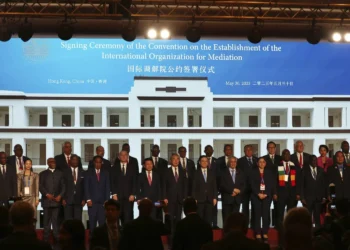A legal debate has emerged following the attempted arrest of Hon. John Ntim Fordjour, with constitutional law expert Prof. Kwadwo Appiagyei-Atua, stating that the action by National Intelligence Bureau (NIB) officers, accompanied by police personnel, did not conform with the law.
The attempted arrest, which was reportedly carried out with a warrant but involved masked officers, raised questions about due process, parliamentary immunity, and the separation of powers under Ghana’s constitutional order.
According to Prof. Appiagyei-Atua, while arrest warrants may not be required in certain instances for ordinary citizens, the specific circumstances of the arrest of Ntim Fordjour did not justify such an exception.
“What happened did not fall into that category and so in that situation, an arrest warrant was definitely needed”
Prof. Appiagyei-Atua, Constitutional Law Expert
He referenced the principle of ‘in flagrante delicto,’ an exception that allows an arrest without a warrant if the suspect is caught in the act of committing an offence, as being inapplicable in this situation.
In his expert opinion, it was good and necessary that the NIB made sure they had a warrant before going to the MP’s residence to effect it.
Despite lauding these efforts made by the arresting officers, he pointed out flaws in the entire process, seeing as the person in question is an MP.
The professor also highlighted concerns about the identity of the security personnel who carried out the arrest.
“The law is clear that if you are masked, we cannot know your identity, therefore, you cannot effect arrest, and the person you are going to arrest can even cause you harm in a self-defensive manner”
Prof. Appiagyei-Atua, Constitutional Law Expert

Not Just Any Citizen
Addressing the unique status of Ntim Fordjour as a sitting Member of Parliament for Assin South, Prof. Appiagyei-Atua made it clear that his arrest should have been handled through parliamentary channels.
The constitutional framework, he explained, provides specific “immunities and privileges” to Members of Parliament to ensure institutional balance and protect the legislative arm from “executive overreach.”
“As a member of parliament, the person is clothed” with some special protection against certain practices common to the ordinary citizen.
Standard procedure, he noted, would involve officially notifying the Speaker of Parliament and seeking permission to summon or detain the MP in question.
In certain cases, interrogations may even take place on parliamentary premises, a measure designed to preserve the dignity and autonomy of the legislative body.
Separation of Powers at Stake
Prof. Appiagyei-Atua underscored that these procedures are not ceremonial courtesies but critical constitutional safeguards.
“These are courtesies that are supposed to be enjoyed by members of parliament by virtue of the fact that it is one of the means of ensuring separation of powers”
Prof. Appiagyei-Atua, Constitutional Law Expert
Given that the police and other law enforcement agencies operate under the executive branch, headed by the president, adherence to due process in cases involving MPs is vital to ensuring proper checks and balances.
The law expert warned that bypassing these protocols risks compromising Parliament’s ability to perform its oversight functions and could pave the way for future abuse of power by the executive.
The arrest of Hon. John Ntim Fordjour over his Gran Canaria flight allegations was thwarted by the NPP.
The party upon getting word of his impending arrest thronged to the MP’s residence in their numbers and refused to allow him be subjected to what they described as a humiliating situation.
Upon their strong intervention, the NIB and police officers backed off and invited the MP to turn himself in for questioning at 10 am the following, accompanied by the Minority leader in Parliament, Hon. Afenyo Markins.
Despite having a warrant for his arrest, the NPP still argues that as a statesman, the whistleblower for the suspicious Gran Canaria flights should not be intimidated by the state.
His attempted arrest by masked security agents places Ghana’s commitment to the rule of law under scrutiny in some eyes.
Others believe Hon. Ntim Fordjour’s arrest was warranted and way overdue given his refusal to cooperate with the state security by providing required evidence to his accusations.
READ MORE: Africa Secures Energy Future with Refining Investments




















